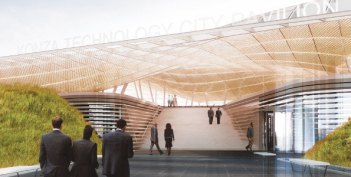Published on 13 February 2013 by Linet Kwamboka
Early in the New Year, the proposed ‘Silicon Savannah’ progressed from an ICT Park to a 10 billion USD technology city. This progress was marked by the formation of the Konza Technopolis Development Authority (KOTDA) and design plans for the cities landmark building – the Konza City Technology Pavilion.
Located in Machakos and Makueni counties, the development will sit on over 5,000 acres of land and according to a recent report; it will be constructed over a period of twenty years using a public-private financing model (http://www.theeastafrican.co.ke).
In my opinion, Konza City is the perfect idea; one that I wish had been started about a decade ago.With a plan such as the Konza City Master Plan, all of the unplanned infrastructure and building structures that cause problems in unplanned cities would not be much of a problem in Konza City.
When looking at cities all over the world, the developed world, it is very simple to see why planned development is key for income inequality as well as for basic logistical planning:
- transportation services
- waste management
- energy distribution
- new development
- resource allocation
- location addresses
Effective addressing and transportation are two major impediments of unplanned developments. As a result, Nairobi is currently crippling with citizens having to incur high costs in travel due to a poor sense of addressing and an inadequate routing system.
Konza City for me is more of the kind of model that the new, devolved system should take. Because we are at an early state in the county government system, a prototype such as Konza City could help harness the full potential of a county system into a truly smarter Kenya.
This is all of course possible if there are enough investors and unfortunately the Konza City model is the guinea pig when it comes to development. Local investors who have an eye on short term investments will stay away from untested development models and continue to invest more in unplanned real estate within the already congested Nairobi city. This will result in Konza City being fully owned by foreign investors, causing a draw of critics. I have seen much of the existing criticism mar the idea of the city but in my opinion, this is mostly from people who have not quite travelled the world to see what Kenya is missing out on by allowing such high amounts of unplanned growth in our cities.
Success belongs to the optimist. We have the full potential to show that planned development can work to our advantage.
Linet Kwamboka is a Software Engineer at Carnegie Mellon University Department of Computer Science. She has been a technology consultant in the Kenyan computing space including for the Government of Kenya and the World Bank on Open Data and Open Government Partnership. She is the author of the blog www.datascience.co.ke.

